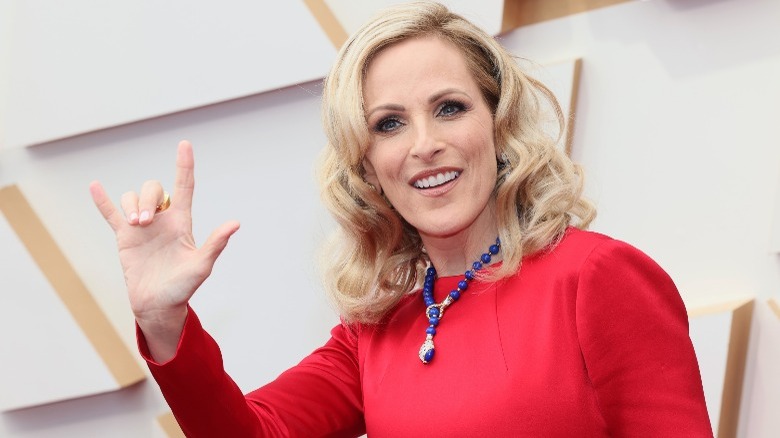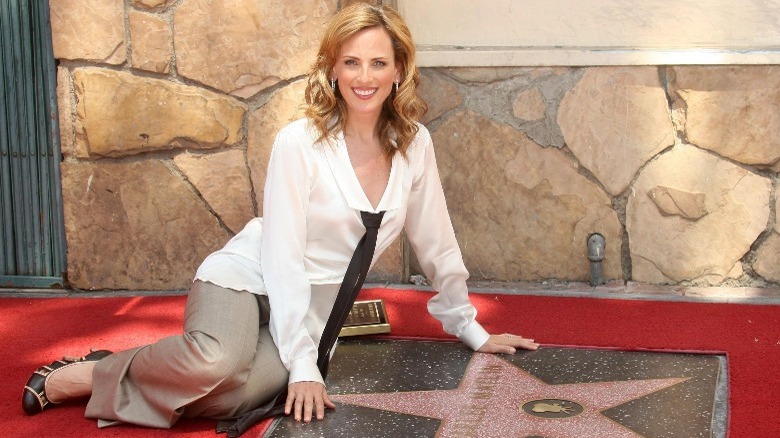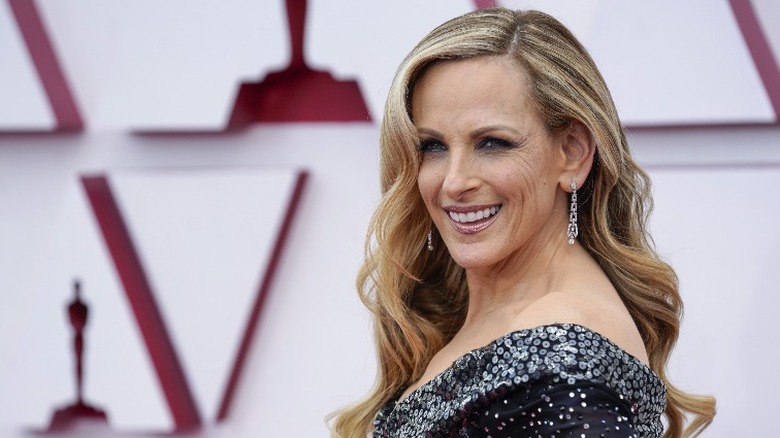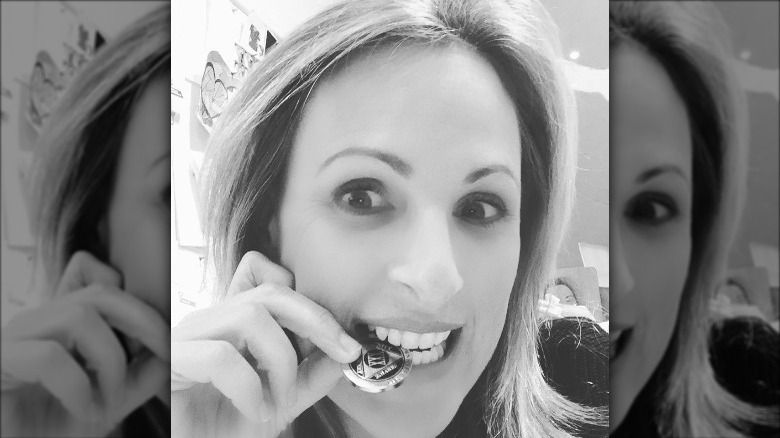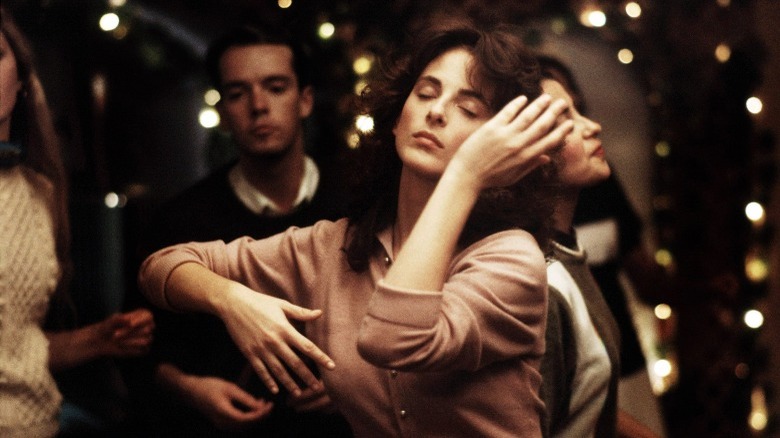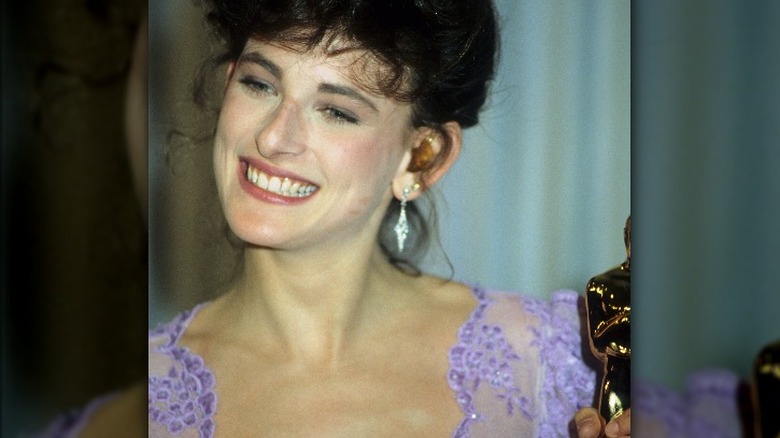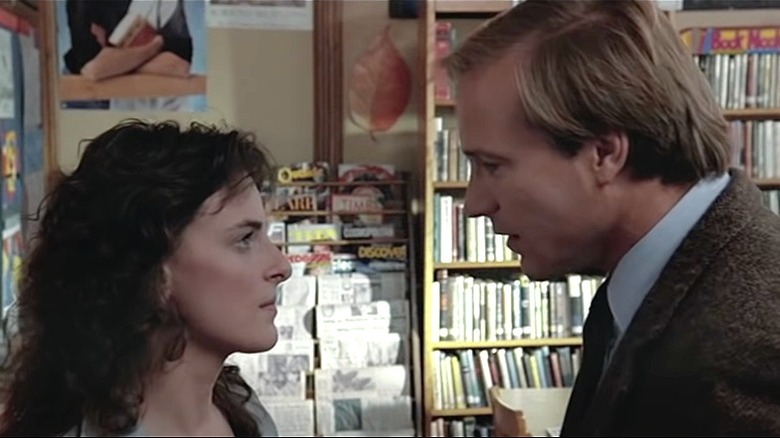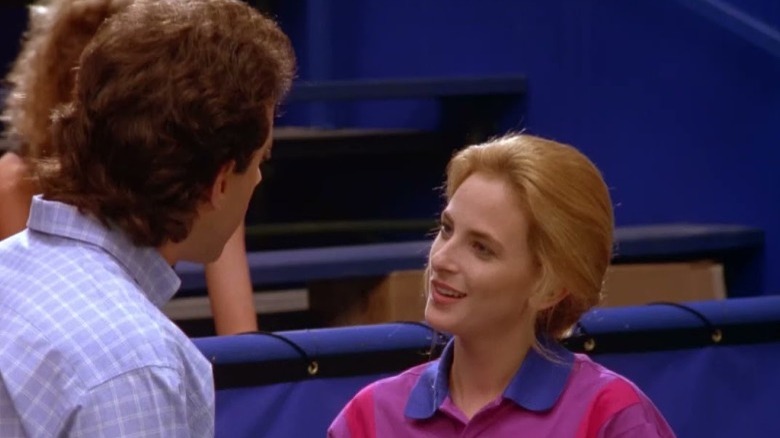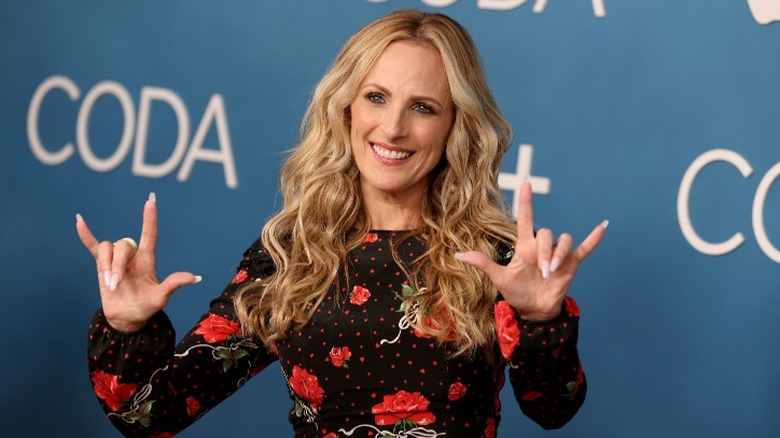Tragic Details About Marlee Matlin
This article contains mentions of sexual assault, domestic abuse, and addiction.
Marlee Matlin is without a doubt the most visible deaf actor in Hollywood, a charge she has held for decades now. The star made her screen debut in "Children of a Lesser God" in 1986, and it was that role that catapulted Matlin to fame, positioning her as a serious actor and earning her a multitude of awards, including the Oscar for best actress. In the years since, Matlin has remained active in Tinseltown, as an actor as well as a producer and an advocate for deaf inclusion. She has appeared in dozens of films and television series over the course of her career, including the film "CODA," which received best picture honors at the 2022 Academy Awards.
Matlin's other notable film credits include "The Player" and "Hear No Evil," but the bulk of her work has been on the small screen. She has continued to open doors for deaf representation with series regular roles on shows like "Reasonable Doubts" — for which she was twice nominated at the Golden Globes — and "The L Word," along with recurring appearances on a wide variety of programs such as "The West Wing," "Picket Fences," and "Switched at Birth." She has been nominated for four Primetime Emmy Awards in the guest actress categories for her work on shows such as "Seinfeld" and "The Practice." Despite her success, Matlin has faced a number of personal and professional struggles throughout her life. Here are some tragic details about Oscar-winning star Marlee Matlin.
Marlee Matlin lost her hearing before the age of two
Marlee Matlin lost her hearing when she was only one-and-a-half and, for a long time, believed it to be a result of high fevers from the roseola virus (per ABC News). It was not until her early 40s that the actor learned that her genetics were also likely a factor, according to The Guardian. In her autobiography, "I'll Scream Later," the actor discusses how a malformed cochlea may have been the cause of her hearing loss. "That meant that I could likely hear when I was born, but that my hearing would recede over the first couple of years of my life," she explained in the book.
Though Matlin has said she had an overall pleasant childhood, she has noted feeling excluded as the only deaf person in a family of hearing individuals, telling The Guardian that she often was angered watching her siblings do things like call their grandmother or play musical instruments. This feeling of disconnection largely subsided by the time Matlin was a preteen, she said. Even still, she has admitted to struggling with group conversations in her family. "There are times when I'm sitting there, and everybody's talking in the family, and I'm always using my voice, like, 'Hello, I'm here,'" she told KCRW. "Some days, I do get upset if I don't get enough communication or [I need to] get more information than I typically would to operate in my life, from my kids or from extended family."
The actor was molested by a babysitter
Marlee Matlin has described her childhood as good in many interviews, and she has maintained that her early life in the suburbs of Chicago was rather typical, despite her deafness. "My childhood was so normal," she told CBS News. "I was just so happy to have great neighbors, great schools, great friends, great family." Amid her declarations of ordinariness, Matlin has also revealed past traumas that she experienced as a youngster. For instance, she revealed in her autobiography "I'll Scream Later" that she was molested at the age of 11 at the hands of a babysitter.
Matlin's abuser was a 16-year-old female caregiver who had been entrusted to watch over her, and the experience deeply impacted the actor. "I masked it, and I covered it up. ... And I masked it at a very early age with drugs," she revealed to Joy Behar, who guest hosted "Larry King Live" during Matlin's 2009 appearance. The actor also noted that she told no one of the tragic experience — not a teacher, not a parent, not even a friend. The first person she told was her husband, police officer Kevin Grandalski, whom she married in 1993. Though Behar asked Matlin if her deafness was perhaps the reason she was targeted, there seems to be no indication that it was a factor.
If you or anyone you know has been a victim of sexual assault, help is available. Visit the Rape, Abuse & Incest National Network website or contact RAINN's National Helpline at 1-800-656-HOPE (4673).
She shares her story for a reason
Though it is heartbreaking to learn that Marlee Matlin was molested as a preteen, her dreadful experience with sexually inappropriate authority figures did not end there. Three years after her babysitter's abuse, Matlin was again molested, this time by a teacher. "It was a teacher who I looked up to and became friendly with. At the time ... I wanted good grades, you know, and I wanted his approval," she told Joy Behar on CNN.
Matlin would later learn that the married teacher took advantage of other young females in a similar manner, but, at the time, she did not recognize the full extent of the impropriety. "I didn't think it was illegal," she admitted to Behar. "I mean, that didn't even pop in my mind. I was never told what was right and what was wrong about the situation. And at the time, I'm thinking it's wrong because he's married." In an ABC News interview, Matlin shared that she decided to publicly reveal her abuse because of her young daughter (and perhaps others) who may benefit from hearing her story. Given her experiences, it is no surprise that Matlin turned to substances to shield her from her pain — a path that has led to a life-long battle with addiction.
If you or anyone you know has been a victim of sexual assault, help is available. Visit the Rape, Abuse & Incest National Network website or contact RAINN's National Helpline at 1-800-656-HOPE (4673).
Marlee Matlin struggled with addiction
Marlee Matlin's early exposure to marijuana eventually led to a problem with cocaine, which escalated to the point where she needed professional intervention. Less than two days after she won a Golden Globe Award for her performance in "Children of a Lesser God," Matlin checked herself into the Betty Ford Center, against the advice of those around her. "No one wanted me to go into rehab, because I had just made a movie and the potential of getting an Oscar was going in my direction," she told The Guardian in 2021. "And I said: 'Yeah, but to keep going I need to take care of myself first.' I had to get sober so I could think clearly."
It was while in rehab that Matlin learned of her Academy Award nomination, according to a CNN interview she did in 2009. It was also there that she apparently came up with the name for her autobiography, "I'll Scream Later," which was her response to finding out the big news. In 2017, Matlin celebrated 30 years of sobriety by posting a photo with her chip on social media. "TODAY – 30 years of being sober (that's my chip)! I thank my husband, children, family, friends and ME. I cannot imagine my life without it," she tweeted.
If you or anyone you know is struggling with addiction issues, help is available. Visit the Substance Abuse and Mental Health Services Administration website or contact SAMHSA's National Helpline at 1-800-662-HELP (4357).
She still hurts from a film critic's 1986 comment
Words have power, and, in a rare move for a celebrity, Marlee Matlin has discussed how distressing critical commentary can be. And there is one particular reviewer — American movie critic Rex Reed — that she continues to abhor, more than three decades after his 1986 critique of her work in "Children of a Lesser God." In her autobiography, Matlin even captioned a childhood photo with the words "Kiss my ass, Rex!" If that does not say "I'm still steaming," we're not sure what does. Though, for what it's worth, Reed is also the critic who started the rumor that Marisa Tomei's name was wrongly announced at the Oscars, so he has a history of nastiness and conspiracy theories (per Salon).
The root of Matlin's anger is not that someone dared to negatively evaluate her performance, but that Reed made comments that stemmed directly from ignorance. "[He said] I won out of pity — that I was a deaf person playing a deaf role, how is that acting?" she explained in a 2021 interview with The Guardian. "There are hearing people playing hearing roles; how's that any different? That's what we call ableism, or audism." In a career plagued with roadblocks and indignities, Reed's review stands out as one of the most degrading moments Matlin has had to face. It is also likely the reason she has become such a staunch advocate for deaf representation in front of and behind the camera.
The pressure Marlee Matlin felt after winning her Oscar
Winning an Academy Award is a monumental achievement that most actors can only hope for, but it also brings with it lots of expectations for future endeavors. Marlee Matlin was only 21 when she won her best actress Oscar. She was a fresh face in Hollywood with no other credits under her belt aside from the one screen performance. To date, she remains the youngest ever winner in the category and the sole female deaf actor to win an Academy Award (per the New York Post). Matlin broke barriers for a community that is still fighting for representation in the media, but that comes with responsibility and heaviness. Representing a marginalized community is a weighty thing for any actor, let alone one so young.
Though her "CODA" co-star Troy Katsur became an Oscar winner himself in 2022, for many years, Matlin was the sole face of acclaimed deaf actors. She alone was left holding the mantle for representing the deaf community in Hollywood, which is something that brought its own set of pressures. "When I won the Oscar, the community was very, obviously very thrilled, certainly. And then they said, 'Okay, now what? What are you gonna do for us?'" she explained on CBS "Sunday Morning" in an interview with Ben Mankiewicz, host of Turner Classic Movies. "It was a heavy load."
She was in an abusive relationship
Marlee Matlin was only 19 when she met her 35-year-old "Children of a Lesser God" co-star William Hurt, but the striking age difference did not stop the two from developing romantic feelings for one another. They dated for two years, and Matlin spoke kindly of Hurt upon his death in 2022, though she was reportedly a bit surprised to be asked about him. "We've lost a really great actor and working with him on set in 'Children of a Lesser God' will always be something I remember very fondly," she told a reporter on the Critic's Choice Awards' red carpet (via the Daily Mail). "'He taught me a great deal as an actor and he was one-of-a-kind.'" Matlin's words of remembrance gained traction particularly because of the nature of their relationship, which was tumultuous and abusive.
The relationship started during Matlin's initial screen test, continued throughout filming, and led to the pair cohabitating for a couple years (per CNN). But in her 2009 autobiography, Matlin discussed the physical, emotional, and sexual abuse she suffered at the hands of Hurt. She described incidences of violence that resulted in "fresh bruises" and vividly recounted rape at the hands of her partner. When Matlin won her Academy Award, Hurt (who lost that evening) lobbed belittling remarks her way in the limo after the event. "What makes you think you deserve it? There are hundreds of actors who have worked for years for the recognition you just got handed to you. Think about that," she recalled her co-star saying.
If you or someone you know is dealing with domestic abuse, you can call the National Domestic Violence Hotline at 1−800−799−7233. You can also find more information, resources, and support at their website.
If you or anyone you know has been a victim of sexual assault, help is available. Visit the Rape, Abuse & Incest National Network website or contact RAINN's National Helpline at 1-800-656-HOPE (4673).
Marlee Matlin has had a hard time finding projects
Marlee Matlin might have expected the doors of Hollywood to open up after her Oscar win, as they tend to do for many young winners. In reality, the acclaimed actor had a relatively tough time finding projects due to her deafness. "Offers don't overwhelm me," she admitted to Town & Country in 2021. "My phone is not ringing off the hook constantly. I have to work harder to find projects that I can do." Matlin has learned that roles like Sarah Norman in "Children of a Lesser God" — leading roles where deaf people are front and center — are few and far between. "I think people who have the power are just afraid when it comes to deaf and disabled characters in feature films. It's just the way it is," Matlin told TIME magazine.
Though she has continued to work in Hollywood, Matlin's standout projects have often been on a much smaller scale than her film "CODA," which features a majority-deaf cast. But whether it has been a one-off appearance as a lip-reading girlfriend on "Seinfeld" or her recurring role as a pollster on "The West Wing," Matlin has been fantastic in all of her projects. And while media with hearing-impaired people in leading roles remains rare, there has been a slow progression toward inclusion with films such as "Sound of Metal" and television shows like "Deaf U" and "Switched at Birth," on which Matlin played the mother of a deaf son. She also works behind the scenes and produced a documentary special for A&E in 2018 called "Deaf Out Loud."
She nearly quit CODA because of casting issues
As an advocate, Marlee Matlin has been instrumental in moving deaf representation forward — not just in film, but in other areas, as well. For instance, Matlin is currently pushing for the presidential administration to employ ASL interpreters at their speeches and press briefings (per KCRW). One cannot help but relate Matlin's activistic nature to her experiences as an actor. "I like to take advantage of the fact that I'm in front of the media," she told KCRW in an interview. "But I've always been that way. I've always been that kind of Deaf person," she shared. It did not shock us to learn, then, that Matlin was instrumental in the casting process for her award-winning film, "CODA."
Though "CODA" is about a family of all-deaf characters, save for teenage daughter Ruby (Emilia Jones), producers pushed for a big-name hearing actor in the role of Matlin's husband Frank. She was adamant that they cast a deaf actor in the role, even going so far as to put her own participation on the line. "You can't have hearing actors play deaf characters," she said in a 2021 TIME interview. "Regardless of how big of a name you put in there, or box office. Playing a deaf character is not a costume you can put on or take off at the end of the day." With "CODA" winning the best picture Oscar, we can only hope that Hollywood continues to push the boundaries of inclusion for not only deaf actors, but all people with disabilities and differences.


